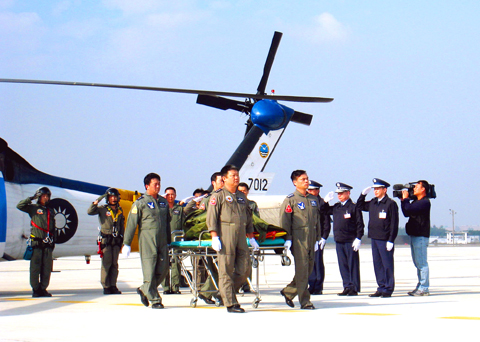The bodies of two pilots aboard an Air Force Academy twin-seater T-34C trainer plane that went missing during a training flight on Tuesday were found yesterday by an Army rescue team on a mountain in Kaohsiung County, the military said.
The wreckage of the plane was found in a mountain forest in the county’s Namasia Township (那瑪夏).
“We are truly sorry to have to confirm the death of the two pilots,” said Lieutenant General Yen Teh-fa (嚴德發), commanding officer of the Army’s Eighth Legion.

PHOTO: CNA
Yen, in charge of the rescue operation, said that Second Lieutenant Chen Tse-yu’s (陳澤宇) body was found on a large rock face at about 1:10pm. One hour later, the body of Yau Chien-bao (饒健保), Chen’s flight instructor, was discovered under a large piece of debris at a location far away from where Chen was found.
Yen said that rescuers onboard an Army helicopter discovered the crash site 5km southeast of the aircraft’s last reported location at 12:14pm and eight special forces members were immediately dropped at the scene, where they located Chen’s body.
Yen said the crash site was amid tall trees and was not discovered for two days because the crash had not caused a fire or explosion.
Colonel Chang Kuo-hua (張國華), the spokesman for the Air Force Academy, which maintained the T-34, said there were no flight recorders, beacons or GPS devices on the aircraft, but added that there were GPS trackers on Chen’s and Yau’s parachute packs.
The GPS trackers turn on automatically once a pilot abandons the plane and uses the parachute.
Yen said there was no evidence at the scene to indicate that the two pilots had attempted to escape prior to the crash.
Chen’s and Yau’s bodies were taken by military helicopter to the Air Force hospital in Gangshan Township (岡山), Kaohsiung County, while Air Force personnel remained at the crash site to collect debris for further investigation.
Chen Tse-yu, a second lieutenant who graduated from the academy in 2008, had 110 hours flight time, while his 48-year-old instructor had flown 4,235 hours. Yao retired from the Air Force last year, but later returned to serve as a flight instructor.
The US-built T-34 trainer planes have been in service for more than 30 years. The Air Force purchased a batch of T-34C planes from the US in 1985 for basic flight training.
The military grounded all T-34C trainers for safety checks after Tuesday’s incident, military sources said.
ADDITIONAL REPORTING BY CNA

MORE VISITORS: The Tourism Administration said that it is seeing positive prospects in its efforts to expand the tourism market in North America and Europe Taiwan has been ranked as the cheapest place in the world to travel to this year, based on a list recommended by NerdWallet. The San Francisco-based personal finance company said that Taiwan topped the list of 16 nations it chose for budget travelers because US tourists do not need visas and travelers can easily have a good meal for less than US$10. A bus ride in Taipei costs just under US$0.50, while subway rides start at US$0.60, the firm said, adding that public transportation in Taiwan is easy to navigate. The firm also called Taiwan a “food lover’s paradise,” citing inexpensive breakfast stalls

TRADE: A mandatory declaration of origin for manufactured goods bound for the US is to take effect on May 7 to block China from exploiting Taiwan’s trade channels All products manufactured in Taiwan and exported to the US must include a signed declaration of origin starting on May 7, the Bureau of Foreign Trade announced yesterday. US President Donald Trump on April 2 imposed a 32 percent tariff on imports from Taiwan, but one week later announced a 90-day pause on its implementation. However, a universal 10 percent tariff was immediately applied to most imports from around the world. On April 12, the Trump administration further exempted computers, smartphones and semiconductors from the new tariffs. In response, President William Lai’s (賴清德) administration has introduced a series of countermeasures to support affected

CROSS-STRAIT: The vast majority of Taiwanese support maintaining the ‘status quo,’ while concern is rising about Beijing’s influence operations More than eight out of 10 Taiwanese reject Beijing’s “one country, two systems” framework for cross-strait relations, according to a survey released by the Mainland Affairs Council (MAC) on Thursday. The MAC’s latest quarterly survey found that 84.4 percent of respondents opposed Beijing’s “one country, two systems” formula for handling cross-strait relations — a figure consistent with past polling. Over the past three years, opposition to the framework has remained high, ranging from a low of 83.6 percent in April 2023 to a peak of 89.6 percent in April last year. In the most recent poll, 82.5 percent also rejected China’s

PLUGGING HOLES: The amendments would bring the legislation in line with systems found in other countries such as Japan and the US, Legislator Chen Kuan-ting said Democratic Progressive Party (DPP) Legislator Chen Kuan-ting (陳冠廷) has proposed amending national security legislation amid a spate of espionage cases. Potential gaps in security vetting procedures for personnel with access to sensitive information prompted him to propose the amendments, which would introduce changes to Article 14 of the Classified National Security Information Protection Act (國家機密保護法), Chen said yesterday. The proposal, which aims to enhance interagency vetting procedures and reduce the risk of classified information leaks, would establish a comprehensive security clearance system in Taiwan, he said. The amendment would require character and loyalty checks for civil servants and intelligence personnel prior to